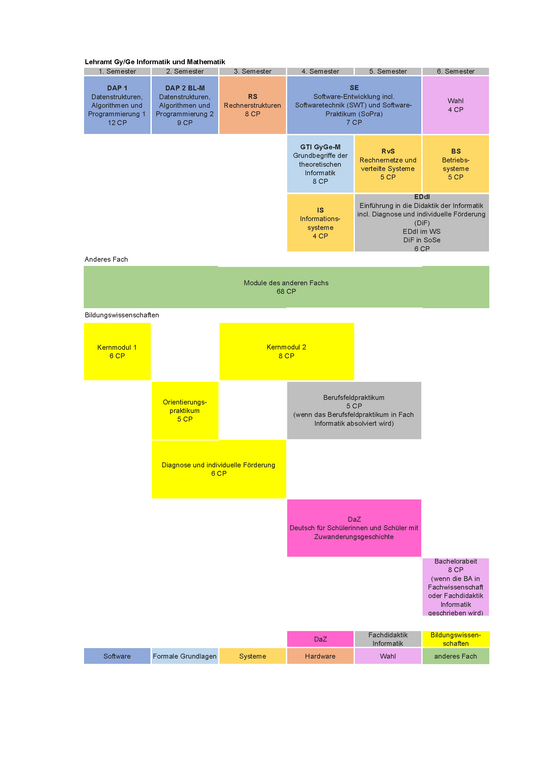Study plans for Bachelor's degree in teaching at grammar schools and comprehensive schools Subject Computer Science and Subject Mathematics
Study plans help you to organize your studies. Please refer to the general notes.
Please consider the following plan as a recommendation and a suggestion to plan your studies.

Structure of the subject Computer Science for the teaching profession at grammar schools and comprehensive schools (Bachelor)
The courses you attend in the subject of computer science prepare you for teaching in the context of the Central Abitur of North Rhine-Westphalia, among other things, but leave many opportunities for broadening and deepening your knowledge, especially in the consecutive master's program.
Software cycle (dark blue) In the courses of the software cycle you learn to develop software. The spectrum ranges from creating small programs to investigating the efficiency of certain algorithms to developing larger projects in a team.
Formal methods (light blue) , which you will later apply and teach yourself in order to analyze problems and solve them as efficiently as possible, you will learn in the courses formal methods and basic concepts of theoretical computer science.
You will gain insight into how computers work in the lecture Computer Structures (red).
You will get to knowcentral systems (orange) of computer science in the lectures from the areas of computer networks and distributed systems and information systems (databases).
In the elective courses (purple) you can broaden and deepen your knowledge according to your preferences.
Finally, the courses on subject didactics (gray) prepare you for your role as a computer science teacher at a Gymnasium or Gesamtschule.
Computer science as a school subject
Computer science is a general subject in all types of schools. At vocational colleges, computer science is also part of the professional knowledge taught. The unique features of computer science include the formal handling of data and information - comparable to the formula system of physics for forces and energy - as well as the analysis of problems, solutions and their efficiency.
An important question in computer science is which problems can be solved automatically and, if so, how efficiently. At the same time, computer science also offers students the opportunity to practically test their ideas by designing, programming, and evaluating computer programs.
"Computational thinking is a fundamental skill for everyone, not just for computer scientists. To reading, writing, and arithmetic, we should add computational thinking to every child's analytical ability." (Jeanette M. Wing)
Practice in the Bachelor's program
You will apply the knowledge imparted in lectures not only in practice groups, but also in the internships integrated into the curriculum. In the software internship, you will work on challenging software projects in groups to gain valuable programming experience and skills such as teamwork and project management.

![[Translate to English:] [Translate to English:]](/storages/zentraler_bilderpool/_processed_/d/f/csm_Informatik_275ba5e5fc.jpg)

![[Translate to English:] [Translate to English:]](/storages/zentraler_bilderpool/_processed_/1/b/csm_Figuren-nachdenklich_e2435967dd.jpg)
![[Translate to English:] [Translate to English:]](/storages/cs/_processed_/6/f/csm_teamwork1_e113f5f13b.png)
![[Translate to English:] [Translate to English:]](/storages/cs/_processed_/e/1/csm_header_ee496f74bf.png)